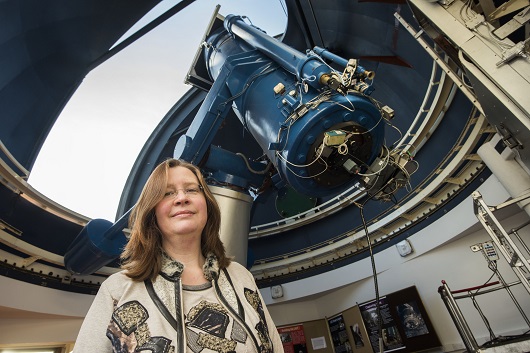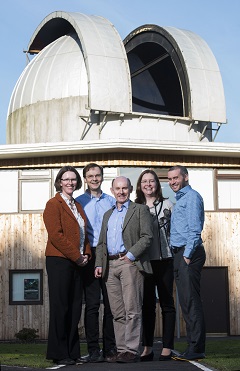Humanity through the lens of the Universe

Astronomers, Philosophers and Geologists at the University of St Andrews have joined forces in the formation of a new Centre for Exoplanet Science.
Drawing together experts from disparate fields, the new centre aims to understand the uniqueness of the Earth in light of the many discoveries of other planets. A key component of their work will be the examination of the societal ramifications of such discoveries.
Researchers at the University have been at the forefront of the search for extrasolar planets, including the discovery of hot Jupiters, measuring planet masses, and the detection of the frozen planet OGLE-2005-BLG-390Lb.
The director of the new centre, Dr Christiane Helling of the School of Physics & Astronomy, said: “Ignoring the typical boundaries between classical academic disciplines, we are combining expertise to understand physical processes and offering reflection on ourselves.
“Throughout history, prevailing human-centric world views have been challenged repeatedly. We now know of thousands of planets orbiting other stars, and still planet Earth appears to be unique.
“Understanding how unusual Earth is, may help humanity appreciate just how special it is.”
The exploration of other planetary systems helps us understand the origins of natural phenomena within our own geosphere. Dr Sami Mikhail from the School of Earth and Environmental Sciences said: “Geoscience is a method for extracting the history of the entire solar system – in a way, the rocks and atmospheres of planets, comets, moons, and asteroids are just pages from a book entitled ‘history’. To a geoscientist, all planets are large complicated books which we can read – if we have the data.”
 The work of the Centre also allows researchers the opportunity to dig into the deepest philosophical questions about the universe, but also to better understand the natural environment of planet Earth.
The work of the Centre also allows researchers the opportunity to dig into the deepest philosophical questions about the universe, but also to better understand the natural environment of planet Earth.
Professor of Philosophy Katherine Hawley from the School of Philosophical, Anthropological and Film Studies at the University said of her involvement:
“For millennia, philosophers have been inspired by gazing at the starry heavens above. Searching for life on other planets poses ethical questions for us here on Earth. It gives us a lens through which to view the value of life on our own planet and deepen public appreciation of the fundamental questions we ask about our existence in the universe.”
The Centre will be formally inaugurated on Monday 23 January. University Principal Professor Sally Mapstone will deliver opening remarks and the event will conclude with a tour of the University Observatory.
Caption
Pictured are (top) Dr Christiane Helling in front of the James Gregory Telescope in the Observatory and (bottom, from left) Professor Katherine Hawley, Dr Peter Woitke, Professor Andrew Cameron, Dr Christiane Helling and Dr Sami Mikhail, Board Members of the Centre for Exoplanet Science.
Notes
The Centre for Exoplanet Science brings together researchers from different disciplines to find out how planets form in different galactic environments, how their atmospheres evolve, and the relation between the evolutionary history of planets and the emergence of life. They are further interested in the moral, ethical and technical aspects of detecting existent or extinct extra-terrestrial life in distant exosystems, or within our own solar system, and the significance of such a discovery for our societies.
Dr Christiane Helling is a Reader and executive director of the newly founded Centre for Exoplanet Science in the School of Physics & Astronomy at the University of St Andrews. The centre combines expertise from astronomy/astrophysics, geosciences, philosophy and social anthropology. Dr Helling was educated in Berlin, Germany, and worked for the European Space Agency before arriving in St Andrews. In St Andrews, she leads the LEAP (Life Electricity Atmospheres Planets) research group for which she was awarded research funding from the European Research Council. Dr Helling is interested in understanding atmospheres of extrasolar planets, cloud formation and lighting, as well as their possible roles for the emergence of life.
Research on hot Jupiters was undertaken with the Wide Angle Search for Planets (WASP).
Research on the measuring of planet masses and bulk densities was undertaken with the High Accuracy Radial velocity Planet Searcher – North (HARPS-N) spectrograph.
Research on the detection of OGLE-2005-BLG-390Lb by gravitational microlensing.
Issued by the Press Office, University of St Andrews. Contact 01334 462530 or email [email protected].
Category University news